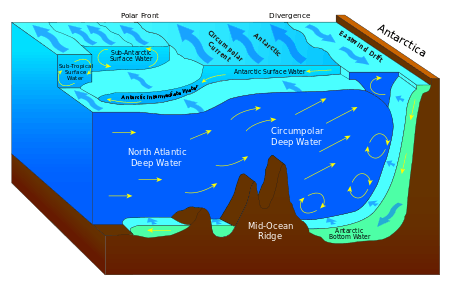Perigean spring tide
A proxigean spring tide (also known as a perigean spring tide) is a tide that occurs three or four times per year when a perigee (the point nearest Earth that the Moon reaches during its 27.3-day elliptic orbit) coincides with a spring tide (when the Sun, the Moon, and Earth are nearly aligned every two weeks).[1] This tide usually adds only a couple of inches to normal spring tides.[1]
Astronomical causes
The Moon's orbit around Earth is elliptical, which causes the Moon to be closer to Earth and farther away at different times. The Moon and the Sun are aligned every two weeks, which results in spring tides, which are 20% higher than normal. During the period of the new moon, the Moon and Sun are on the same side of Earth, so the high tides or bulges produced independently by each reinforce each other (and has nothing to do with the spring season). Tides of maximum height and depression produced during this period are known as spring tide. Spring tides that coincide with the moon's closest approach to Earth ("perigee") have been called perigean spring tides and generally increase the normal tidal range by a couple of inches.[2]
The Ash Wednesday Storm of 1962 which inundated the entire Atlantic coastline of the United States from the Carolinas to Cape Cod, resulting in a loss of 40 lives and over 500 million dollars of property damage, coincided with a perigean spring tide.[3]
See also
Notes
- "A perigean spring tide occurs when the moon is either new or full and closest to Earth". National Ocean Service. National Oceanic and Atmospheric Administration. July 18, 2013. Retrieved February 2, 2014.
- "Tide Predictions & Data Tidal Current Predictions and Data Data Access Problems FAQ - Tide Predictions and Data". National Oceanic and Atmospheric Administration. Retrieved 15 August 2018.
- "The strategic role of perigean spring tides in nautical history and North American coastal flooding, 1635-1976". Gpo.gov. Retrieved 2012-03-11.
References
- Easterbrook, D.J. (1999). Surface Process and Landforms. 2nd ed. Upper Saddle River, NJ: Prentice Hall.
- Duxbury, A.B., Duxbury, A.C., Sverdrup, K.A. (2002). Fundamentals of Oceanography. 4th ed. New York, NY: McGraw Hill.
- http://co-ops.nos.noaa.gov/faq2.html#15
- Wood, Fergus J. (2001). Tidal Dynamics Volume I: Theory and Analysis of Tidal Forces; Volume II Extreme Tidal Peaks and Coastal Flooding. 3rd ed. West Palm Beach, Fl: The Coastal Education and Research Foundation [CERF] ISBN 0-938415-10-7

